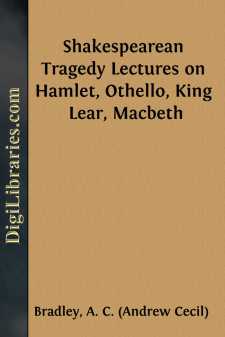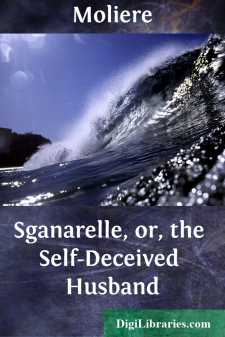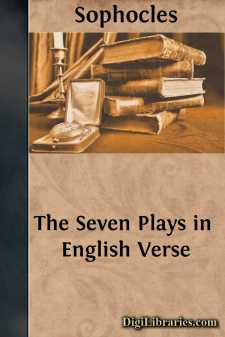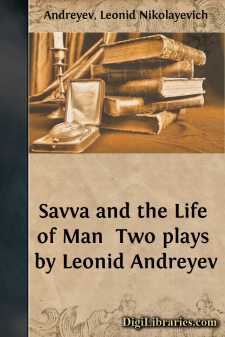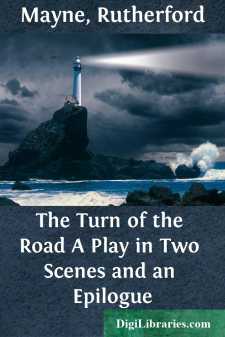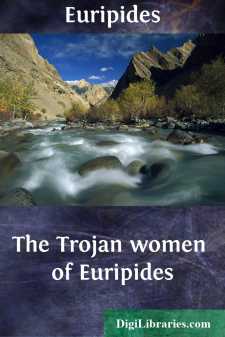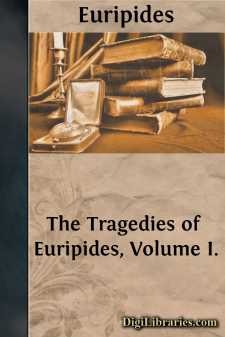Drama Books
Sort by:
LECTURE I THE SUBSTANCE OF SHAKESPEAREAN TRAGEDY The question we are to consider in this lecture may be stated in a variety of ways. We may put it thus: What is the substance of a Shakespearean tragedy, taken in abstraction both from its form and from the differences in point of substance between one tragedy and another? Or thus: What is the nature of the tragic aspect of life as represented by...
more...
by:
Moliere
This play seems to have induced several English playwrights to imitate it. First, we have Sir William D'Avenant's The Playhouse to be Let, of which the date of the first performance is uncertain. According to the Biographia Britannica, it was "a very singular entertainment, composed of five acts, each being a distinct performance. The first act is introductory, shows the distress of the...
more...
by:
Sophocles
PREFACE In 1869, having read the Antigone with a pupil who at the time had a passion for the stage, I was led to attempt a metrical version of the Antigone, and, by and by, of the Electra and Trachiniae. I had the satisfaction of seeing this last very beautifully produced by an amateur company in Scotland in 1877; when Mrs. Fleeming Jenkin may be said to have ‘created’ the part of Dêanira. Thus...
more...
INTRODUCTION I Lady Wilde once told me that when she was a young girl she was stopped in some Dublin street by a great crowd and turned into a shop to escape from it. She stayed there some time and the crowd still passed. She asked the shopman what it was, and he said, 'the funeral of Thomas Davis, a poet.' She had never heard of Davis; but because she thought a country that so honoured a...
more...
INTRODUCTION Encouraged by the reviewer who announced that the Introduction to my previous collection of plays was the best part of the book, I venture to introduce this collection in a similar manner. But I shall be careful not to overdo it this time, in the hope that I may win from my critic some such tribute as, "Mr. Milne has certainly improved as a dramatist, in that his plays are now slightly...
more...
INTRODUCTION For the last twenty years Leonid Andreyev and Maxim Gorky have by turns occupied the centre of the stage of Russian literature. Prophetic vision is no longer required for an estimate of their permanent contribution to the intellectual and literary development of Russia. It represents the highest ideal expression of a period in Russian history that was pregnant with stirring and...
more...
by:
Rutherford Mayne
THE TURN OF THE ROAD. Mrs. Granahan.Is that the whole of them now Ellen?Ellen.Yes that's all now but one.She goes across to grandfather and lifts the plate.Have you finished granda?Grandfather.Yes dearie I have done.He pauses and fumbles for his pipe, &c.Is'nt that a fiddle I'm hearing?Ellen.Yes. Robbie's playing the fiddle in the low room. Mrs. Granahan.Arranging plates on...
more...
by:
Euripides
THE TROJAN WOMEN In his clear preface, Gilbert Murray says with truth that The Trojan Women, valued by the usage of the stage, is not a perfect play. "It is only the crying of one of the great wrongs of the world wrought into music." Yet it is one of the greater dramas of the elder world. In one situation, with little movement, with few figures, it flashes out a great dramatic lesson, the...
more...
by:
Euripides
INTRODUCTION. Euripides, son of Mnesarchus, was born in the island of Salamis, on the day of the celebrated victory (B.C. 480). His mother, Clito, had been sent thither in company with the other Athenian women, when Attica was given up, and the ships became at once the refuge of the male population, and the national defense. Mr. Donaldson well remarks, that the patronymic form of his name, derived from...
more...
by:
Lady Gregory
ACT I Scene: A room in the King's house at Burren.Large window at back with deep window seat.Doors right and left. A small table and somechairs. Dall Glic: (Coming in with tray, which he putson table. Goes back to door.) You can come in,King. There is no one here. King: (Coming in.) That's very good. I wasin dread the Queen might be in it. Dall Glic: It is a good thought I had bringingit in...
more...


